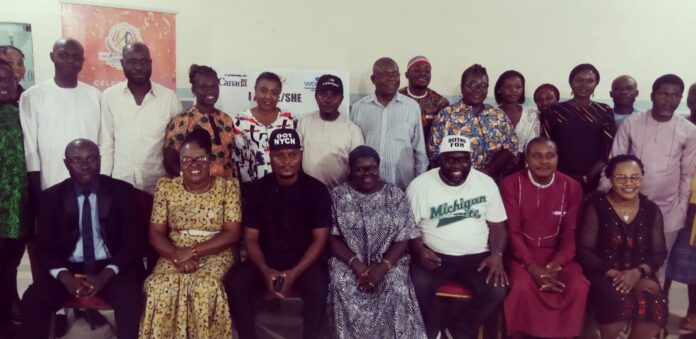From Mba Nnenna- Abakaliki
Stakeholders in Ebonyi State have advocated for the domestication of Gender and Equal Opportunities Bill, by the state government, after being signed into law.
This demand was strongly voiced at a high
-level multi-stakeholder roundtable aimed at advancing women’s political participation in Nigeria.
The event, organized by the Women Aid Collective (WACOL) in collaboration with UN Women and funded by the Government of Canada, took place in Abakaliki, Ebonyi State.
At the roundtable, participants from various political parties, civil society organizations, religious bodies, and government ministries endorsed the “HeForShe” Initiatives. They urged the Ebonyi State government to ensure that 40% of elective and appointive positions are allocated to women.
The Gender and Equal Opportunities Bill, which proposes the creation of 111 special seats exclusively for women in the National Assembly, has successfully passed its second reading in the Senate, with 74 special seats approved at this stage.
This bill seeks to amend the several sections of the 1999 Constitution to enhance gender representation and ensure equal opportunities for women in politics.
Upon passage, it will take effect in the 11th Assembly and be reviewed every 16 years.
The Programme Lead for WACOL, Mrs.Nkechi Igwe emphasized the importance of constitutional and legislative reforms at the state level to ensure the bill’s effectiveness. She also highlighted the need for alliances with supportive men in political parties and government offices to secure increased women’s participation in politics by 2027.
“The state government must not only support the Gender and Equal Opportunities Bill at the national level but also ensure its swift domestication within Ebonyi. We are advocating for 40% of all elective and appointive positions in the state to be reserved for women,” Igwe asserted.
The Commissioner for Women Affairs in Ebonyi State, Barr. Mrs. Felicia Nwankpuma lauded the bill as a crucial tool for fostering a fair and inclusive society. “This bill aims to eradicate discrimination and promote equality for all, regardless of gender. It is designed to empower women economically and secure their full participation in the political process, thus strengthening our democracy,” she stated.
She proposed several strategies to enhance women’s political involvement, including leadership training programs, policy reforms to ensure gender balance, and public campaigns to challenge societal stereotypes. Mrs. Nwankpuma also stressed the importance of building robust networks of women leaders to mentor and support aspiring female politicians.
Also the Chairman of the Christian Association of Nigeria (CAN), Ebonyi state Chapter, Reverend Scamb Nwokolo called on women to support one another in their political endeavors.
He urged them to embrace positive mindset thereby eliminating jealousy and envy among women, while encouraging mutual support in political pursuits.
The Ebonyi state Attorney General and Commissioner for Justice, Dr. Ben Uruchi Odoh, expressed firm support for the bill. He pledged that his ministry would provide the necessary legal backing and advocacy to ensure the bill’s passage and implementation.
“Passing this bill will set a precedent for other states and demonstrate our commitment to fostering an environment where women can aspire, contest, and occupy leadership roles without facing discrimination or bias,” Dr. Odoh stated.
The Chairperson Young Progressives Party (YPP) Hon. Nwogbaga Mercy shared a personal account of workplace discrimination, recalling how she was forced to resign from the State Security Service (SSS) due to pregnancy. She called for the bill’s domestication in Ebonyi State to protect women from similar injustices.
Meanwhile, the stakeholders’ roundtable meeting was well attended by lawmakers, including Hon. Ukie Oluchukwu Ezeali, representing the Afikpo North East Constituency.
Also in attendance were the Chairman of the National Youth Council of Nigeria, Ebonyi State Chapter, Hon. Douglas Ochishi, and traditional rulers from various communities, all of whom voiced their support for increased women’s participation in governance.
Highlights of the event included presentations by Barr. Helen Kalu and Dr. Chinedu Akam Igwe, who provided an in-depth analysis of Ebonyi women’s participation and representation in politics.







